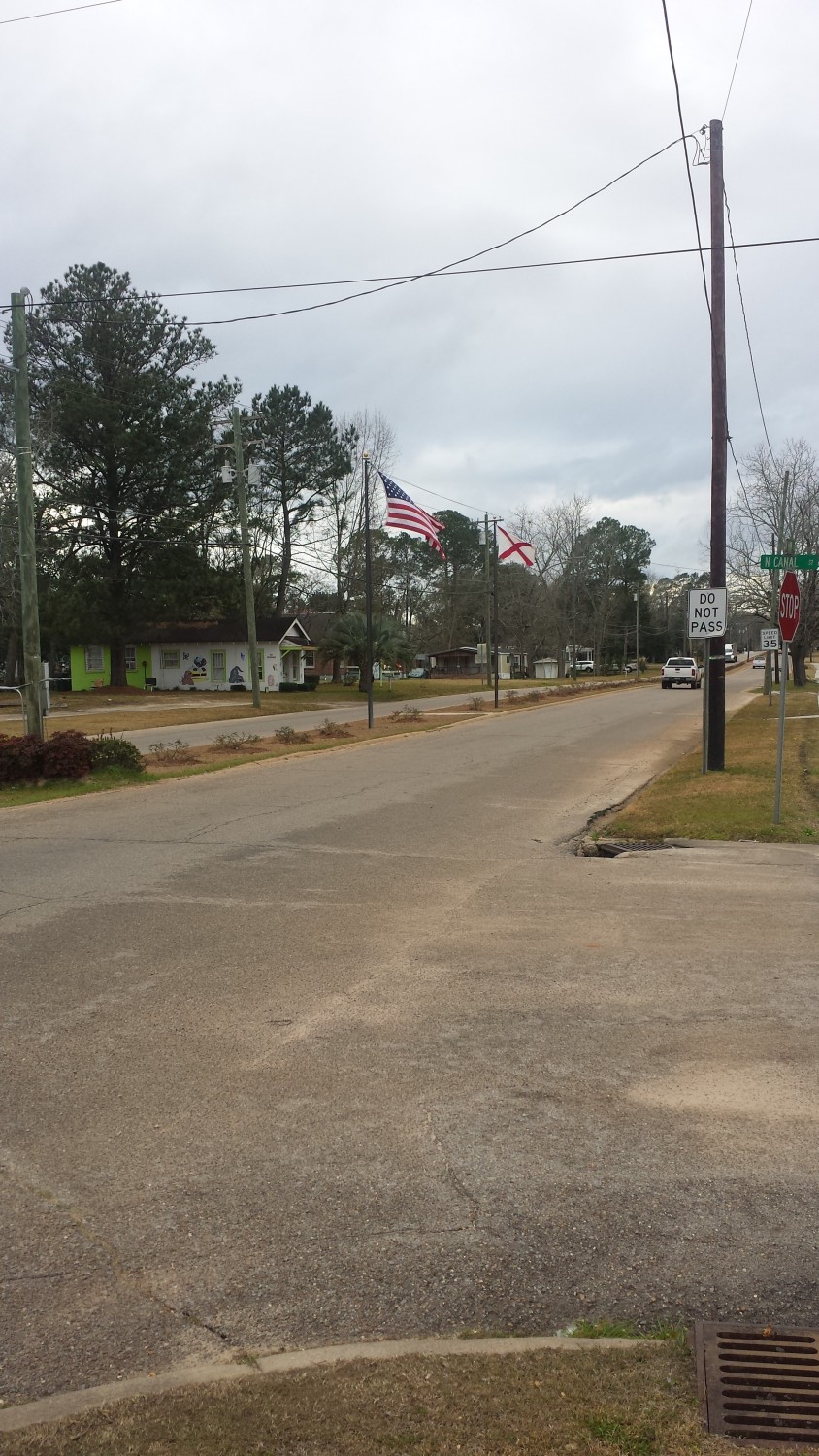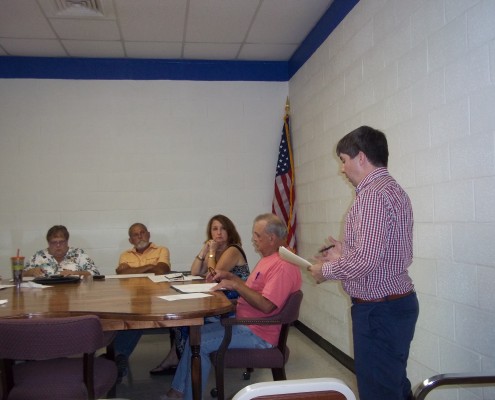
The Southeast Alabama Rural Planning Organization is a joint project between the Southeast Alabama Regional Planning and Development Commission and the Alabama Department of Transportation. Presently, the RPO process is advisory in nature.
The RPO serves as the formal link between ALDOT and rural local governments. This link allows more opportunity for rural communities to communicate with ALDOT. The objectives of the RPO are:
- To improve communication between the rural areas of Southeast Alabama and ALDOT
- To develop documents and data that will be useful to ALDOT and the local governments
- To improve transportation planning in the rural areas,
- To highlight potential construction of needed highway and bridge projects in the rural areas
- To increase highway safety
For official RPO documents and reports, see Data Center.
Meeting Notification
The Southeast Alabama RPO holds semi-annual meetings, typically in the spring and fall. These meetings include Local Public Forums, Technical Coordinating Committee Meetings and Policy Committee Meetings. The Local Public Forums are hosted in each of the seven Southeast Alabama RPO Counties. Following the Local Public Forums, the Technical Coordinating Committee meets in a centralized
location to assess feedback from the local public forums and make recommendations to the Policy Committee. The Policy Committee also meets in a centralized location to make policy decisions. Public participation is welcome and encouraged at all Southeast Alabama RPO forums and meeting. If you wish to receive news releases for upcoming RPO meetings, please send an e-mail with your name and address to evanscyoc@searpdc.org.
Study Area

Regulations
The amendment to the joint Federal Highway Administration and Federal Transit Administration regulations regarding consultation with non-metropolitan local officials as related to transportation planning were issued on January 23, 2003. The regulations require the States to consider the concerns of local elected officials when carrying out statewide transportation planning, to develop a process to consult with non-metropolitan local officials regarding transportation issues, and to consult with non-metropolitan officials when developing the statewide transportation plan and the statewide transportation improvement program (STIP).
The State of Alabama DOT established the RPO program after the West Alabama RPO underwent a pilot project in fiscal year 2005. The project was financed by federal transportation planning funds provided by the Alabama Department of Transportation (ALDOT) and by local government funds provided by the West Alabama Regional Commission. In fiscal year 2007 ALDOT expanded the program by funding 11 other RPOs that cover the other rural counties in Alabama. One of these 11 RPOs is the Southeast Alabama Rural Planning Organization.
Products of the Transportation Planning Process
Work Program
The work program represents the budget and work tasks necessary to accomplish and maintain the transportation planning process within the study area. The work program is developed to coordinate transportation and related planning activities for a cooperative, continuing, and comprehensive planning process. The primary objective of the work program is the development of an integrated planning program that considers the planning activities of each modal group and coordinates these activities to produce a total transportation plan serving all segments of the population. Click here to view or download the current RPO Work Program.
Safety Program
The RPO collects a list of safety suggestions at county local public forums and committee meetings. In general, the safety suggestions are low cost projects that have the potential to reduce traffic accidents. The suggestions are forwarded to appropriate jurisdictional agencies, including: municipal planners, county engineers, ALDOT District Engineers, ALDOT 7th Division Engineers, and other relevant agencies.
Regional Needs Assesment
The RPO produced an advisory regional needs assessment that outlines transportation projects that addresses regional transportation goals and strategies as identified by the RPO committees. The RPO adopted the assessment in November 2008. The assessment includes a prioritized project list for each county and a prioritized list of regional projects. The purpose of the assessment is to document the long-range transportation needs of southeast Alabama as identified by the elected and appointed officials in the area. The assessment is intended to help local governments address and prioritize their transportation needs. The assessment should also help ALDOT develop the statewide plan and the Statewide Transportation Improvement Program and schedule the construction of transportation projects based on their limited budget. However, the assessment is strictly advisory. No funds have been set aside to undertake any of the strategies or projects included in the regional needs assessment. An updated version of this regional needs assessment will be adopted in 2016.
Committees
The Southeast Alabama Rural Planning Organization (RPO) manages the Southeast Alabama Rural Transportation Planning Process. The RPO is composed of two committees. The Policy Committee is the official decision-making body of the process. The Policy Committee is served by an advisory committee: the Technical Coordinating Committee (TCC). The Bylaws of the Southeast Alabama Rural Planning Organization is in Appendix C.
Policy Committee
The Policy Committee serves as the official decision-making body for the Southeast Alabama Rural Transportation Planning Process. In this capacity the Policy Committee determines the content of all documents and recommendations that are provided to the Alabama Department of Transportation. The Policy Committee’s responsibilities include providing overall guidance to the planning process, review and approval of all process plans and programs, and appointing TCC members.
The Policy Committee is composed of twenty-one members, seventeen voting and four non-voting. Each county commission in the Southeast Alabama region has a voting representative on the Policy Committee. A mayor from each Southeast Alabama county is also a voting representative on the Policy Committee. The ALDOT 7th Division Engineers and the Executive Director of SEARP&DC are the other two voting members. The four non-voting members are Federal Highway Administration Division Administrator, the ALDOT Transportation Planning Engineer, the chairman of the RPO’s TCC, and the Transportation Planner for the Southeast Wiregrass Area MPO. The current Policy Committee membership is listed in Appendix D.
Technical Coordinating Committe
The Technical Coordinating Committee (TCC) provides technical support to the Policy Committee. The TCC reviews RPO documents, studies, reports, plans, and programs and provides the Policy Committee with recommendations concerning these items. The TCC members review the planning process products from a technical perspective making certain that all appropriate concerns are addressed, including local planning issues, engineering details, environmental questions, and future growth, among many others. The TCC also has the ability to make alternative recommendations for any of the products.
The TCC coordinates the work of the various departments and agencies involved in the transportation planning process. The local governments, the State DOT, and selected other transportation interests are represented on the TCC. The current TCC membership is listed in Appendix D. The TCC members share information and data that builds and improves the planning processes and products.
Public Participation Process
There is a public participation process that is established to provide active public participation in the transportation planning process. The public involvement plan describes the RPO’s public participation goals and lists strategies to encourage public participation in the transportation planning process. It is presented in Appendix E. A countywide meeting is scheduled to meet two times a year in each respective county. This method of meeting provides local residents and local officials a better opportunity to participate in the planning process.
Title VI Notice and Federal Laws
Title VI Notice – Notifying the Public of Rights Under Title VI Southeast Alabama Rural Planning Organization (RPO)
The RPO operates its programs and services without regard to race, color, and national origin in accordance with Title VI of the Civil Rights Act. Any person who believes she or he has been aggrieved by any unlawful discriminatory practice under Title VI may file a complaint with the RPO.
For more information on the RPO civil rights program, and the procedures to file a complaint, contact 334-794-4093, extension 1412; email crush@searpdc.org; or visit the RPO office at 462 N Oates St., 4th Floor, Dothan, AL 36303.
A complaint may be directly filed with the Federal Transit Administration at the Office of Civil Rights, Attention: Title VI Program Coordinator, East Building, 5th Floor-TCR, 1200 New Jersey Ave., SE, Washington, DC 20590
If information is needed in another language, please write to Title VI Request, Southeast Alabama RPO, P.O. Box 1406, Dothan, AL 36303 or e-mail crush@searpdc.org with the subject line “Interpreter”.
Si se necesita información en otro idioma, por favor escriba a “Title VI Request”, Southeast Alabama RPO, P.O. Box 1406, Dothan, AL 36303 o por e-mail crush@searpdc.org con el asunto “Interpreter”.
Federal Laws and Regulations
The laws that require Departments of Transportation to develop a non-metropolitan consultation process are found in Sections 134, 135, and 315 of Title 23 of the United States Code and Sections 5303-5306, and 5323 of Title 49 of the United States Code. The rules regarding the non-metropolitan consultation process are published in the Code of Federal Regulations (CFRs) as Title 23 Part 450. The regulations require the States to consider the concerns of local elected officials when carrying out statewide transportation planning, to develop a process to consult with non-metropolitan local officials regarding transportation issues, and to consult with non-metropolitan officials when developing the statewide transportation plan and the statewide transportation improvement program (STIP). The regulations reflect the changes resulting from the passage of the Safe, Accountable, Flexible, Efficient Transportation Equity Act: A Legacy for Users (SAFETEA-LU) (Pub. L. 109-59, August 10, 2005).



